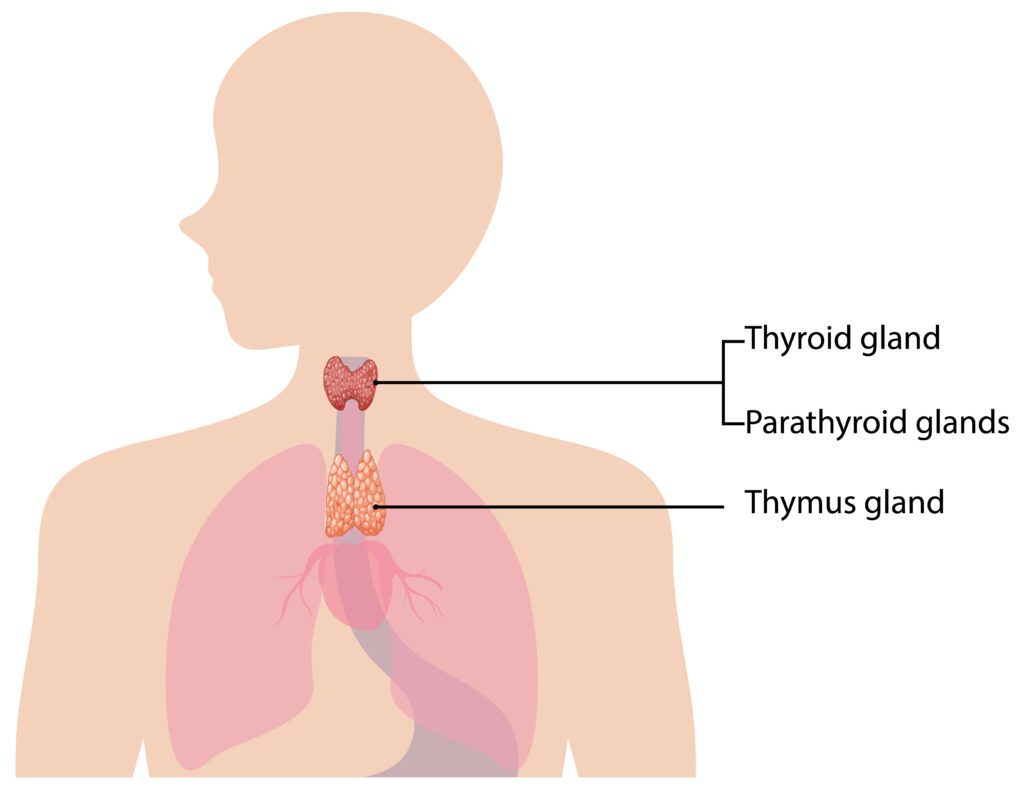Hashimoto's Disease
A Comprehensive Naturopathic Resource
Understanding Hashimoto's From a Doctor Who's Been There
If you’ve been diagnosed with Hashimoto’s disease (also known as Hashimoto’s thyroiditis) or suspect you might have it, you’re likely seeking clear information and effective solutions. As a Naturopathic Doctor who has personally navigated the journey to remission from Hashimoto’s, I understand the often-complex array of symptoms and the desire for a comprehensive approach that goes beyond just managing lab numbers. This page serves as a resource to help you understand Hashimoto’s disease from a naturopathic perspective – from its underlying mechanisms to holistic strategies for managing the condition and reclaiming your well-being.

Dr. Jennifer Luis, ND
She understands Hashimoto's – from personal experience to your personalized care.
What is Hashimoto's Disease?
Hashimoto’s disease is an autoimmune disorder where the body’s own immune system, which normally defends against infections, mistakenly identifies the thyroid gland as a foreign invader and begins to attack it. It stands as the most common cause of hypothyroidism (an underactive thyroid) in regions with adequate iodine intake, such as Canada. This persistent immune assault leads to chronic inflammation of the thyroid, a condition known as thyroiditis. Over time, this inflammation can damage thyroid cells, gradually impairing the gland’s critical ability to produce sufficient thyroid hormones. These hormones are vital messengers that regulate your body’s overall metabolism, profoundly influencing energy levels, weight management, mood, cognitive function, and much more.

The hallmark of this autoimmune process in Hashimoto’s is the production of specific antibodies against key components of thyroid tissue. The primary antibodies typically measured are:
- Thyroid Peroxidase Antibodies (TPOAb): These target Thyroid Peroxidase, an essential enzyme located within thyroid cells that plays a crucial role in the synthesis of thyroid hormones.
- Thyroglobulin Antibodies (TgAb): These target Thyroglobulin, a protein produced by the thyroid gland that is fundamental for storing iodine and producing thyroid hormones.
The presence of elevated levels of these antibodies indicates that the immune system is actively targeting the thyroid. This ongoing attack and the resulting inflammation gradually diminish the thyroid’s functional capacity. Consequently, over time, this typically leads to an underactive thyroid (hypothyroidism) as the gland can no longer meet the body’s demand for hormones. However, it’s also important to understand that in the early stages of Hashimoto’s, or during acute inflammatory flare-ups, the damage to thyroid cells can sometimes cause a temporary leakage of stored thyroid hormones into the bloodstream. This can result in a transient phase of hyperthyroidism (overactive thyroid), potentially causing symptoms like anxiety, palpitations, or unexplained weight loss, before the gland’s function ultimately declines towards hypothyroidism.
Common Symptoms of Hashimoto's Disease
Symptoms can be diverse and often develop slowly, varying from person to person.
Associated with Hypothyroidism
(Underactive Thyroid)
- Persistent fatigue, low energy
- Weight gain or difficulty losing weight
- Brain fog, memory issues, difficulty concentrating
- Low mood, depression, anxiety
- Hair loss (scalp, eyebrows), brittle nails, dry skin
- Constipation, bloating
- Cold intolerance (feeling cold when others don’t)
- Muscle aches, joint pain
- Irregular or heavy menstrual periods, fertility concerns
Associated with Hyperthyroidism
(Can occur in early phases/flares)
- Anxiety, nervousness, irritability
- Insomnia
- Heart palpitations, rapid heartbeat
- Unexplained weight loss
- Increased sensitivity to heat, excessive sweating
- Tremors
General Autoimmune / Inflammatory Symptoms
- General body aches, puffiness, or a feeling of being “inflamed.”
- Some individuals may have elevated antibodies with minimal or no classic thyroid symptoms initially.
Diagnosing Hashimoto's Disease
A thorough diagnosis involves more than just a TSH test:
- Comprehensive Thyroid Panel: TSH, Free T4 (fT4), Free T3 (fT3), and often Reverse T3 (rT3).
- Thyroid Antibody Testing: This is key for diagnosing Hashimoto’s. Elevated Thyroid Peroxidase Antibodies (TPOAb) and/or Thyroglobulin Antibodies (TgAb) confirm the autoimmune nature.
- Thyroid Ultrasound: May be recommended to assess the structure of the thyroid gland, identify nodules, or see characteristic changes associated with Hashimoto’s.
Investigating Root Causes & Triggers of Hashimoto's
A cornerstone of naturopathic medicine is identifying and addressing the underlying factors that may contribute to the development and progression of autoimmune conditions like Hashimoto’s. These can include:
- Genetic Predisposition: A family history of autoimmune disease is a known risk factor.
- Chronic Stress: Prolonged mental, emotional, or physical stress significantly impacts immune function and can trigger or exacerbate autoimmunity.
- Gut Health Imbalances:
- Intestinal Permeability (“Leaky Gut”): Allows substances to pass into the bloodstream that can provoke an immune response.
- Food Sensitivities: Gluten is a well-documented trigger for some individuals with Hashimoto’s due to molecular mimicry. Other food sensitivities can also drive inflammation.
- Dysbiosis/SIBO: Imbalances in gut bacteria or Small Intestinal Bacterial Overgrowth.
- Nutrient Deficiencies: Deficiencies in selenium, zinc, vitamin D, iron, and B vitamins are commonly seen and can impair thyroid function and immune regulation.
- Environmental Factors: Exposure to certain environmental toxins or chemicals.
- Chronic Infections: Some research points to certain viral infections (e.g., Epstein-Barr Virus) as potential triggers in susceptible individuals.
Naturopathic Management of Hashimoto's Disease
In my practice, supporting patients with Hashimoto’s involves a comprehensive, individualized strategy aimed at calming the autoimmune response, optimizing thyroid function, resolving symptoms, and improving overall quality of life.
Personalized Dietary & Nutritional Strategies:
- Anti-Inflammatory, Whole-Foods Foundation: Emphasizing nutrient-dense, unprocessed foods. The specifics will be individualized based on several factors.
- The Gluten-Hashimoto’s Connection: Based on research and clinical experience, a strict gluten-free trial is often a foundational recommendation, as many individuals see improvements in antibodies and symptoms.
- Optimizing Key Thyroid Nutrients: Ensuring adequate intake and absorption of selenium, zinc, magnesium, iodine (carefully balanced, as excess can be problematic), Vitamin D, B vitamins, and iron through diet and targeted supplementation.
- Supporting Blood Sugar and Insulin Balance: Critical for overall hormonal health and reducing inflammation.
Supporting Gut Health & Immune Modulation:
- Protocols to heal intestinal permeability (“leaky gut”) caused by flora or foods
- Strategies to rebalance gut flora (probiotics, prebiotics, antimicrobial herbs if needed).
- Utilizing natural and pharmaceutical agents to help modulate the immune system and reduce inflammation.
Stress Management & Adrenal Support:
- Incorporating stress-reduction techniques (mindfulness, yoga, meditation, reading, listening to music, journaling).
- Supporting adrenal gland function with adaptogenic herbs and lifestyle adjustments.
Optimizing Thyroid Hormone Levels (When Necessary):
- While the goal is to support the body’s own function, thyroid hormone medication is often essential for managing hypothyroidism in Hashimoto’s Disease.
- I work with patients to find the right type and dose of medication, considering options like levothyroxine (T4), liothyronine (T3), desiccated thyroid extract (NDT), or compounded T4/T3, while also focusing on factors that support the body’s conversion of T4 to the active T3 hormone.
Lifestyle for Long-Term Wellness:
- Prioritizing restorative sleep.
- Engaging in appropriate and enjoyable physical activity.
- Minimizing exposure to environmental toxins where possible.
- Determining the root cause and working to eliminate when possible
Achieving Remission in Hashimoto's Disease
It is possible to achieve remission with Hashimoto’s. This typically means a significant reduction or normalization of thyroid antibodies and a resolution or substantial improvement in symptoms. While the underlying autoimmune tendency may persist, the goal of naturopathic care is to remove triggers, reduce inflammation, and rebalance the immune system so that the thyroid is no longer under attack. Proactive, long-term management helps maintain this remission and minimize potential flare-ups. My own journey to remission is a testament to this possibility and deeply informs my approach.

Navigating Your Hashimoto's Journey
If you are living with Hashimoto’s Disease, understanding these multifaceted aspects is the first step toward empowerment. Partnering with a healthcare provider who will investigate thoroughly and create a personalized plan is key.
Hashimoto’s disease is more than just a thyroid problem; it’s a complex autoimmune condition that requires a comprehensive and individualized approach. By addressing root causes, supporting overall immune and endocrine balance, and empowering you with the right tools and knowledge, significant improvements in health and quality of life are possible.
If you are navigating Hashimoto’s and seeking a comprehensive, root-cause naturopathic approach in Vancouver or BC, I invite you to explore the services offered at my clinic. Understanding your individual situation is the first step towards a personalized plan for wellness.
Ready to Address Hashimoto's Disease at Its Root?
Discover how Dr. Jennifer Luis's naturopathic expertise, informed by her own journey, can help you address the root causes of your Hashimoto's and create a tailored plan for lasting relief and vibrant health.